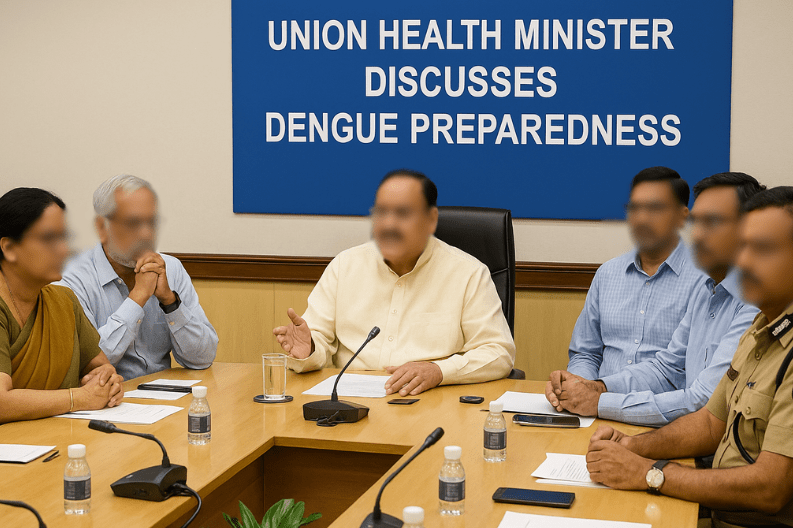On Monday, the Union Health Minister discusses Dengue preparedness in a high-level meeting held in Delhi. The meeting brought together senior officials from the Central and Delhi Governments, hospital representatives, and municipal authorities to review the city’s readiness against dengue.
Dengue, a mosquito-borne viral illness, remains a major public health concern. Delhi has reported 964 cases so far this year, compared to 1,215 cases during the same period last year. This decline suggests that the city’s control measures are proving effective.
However, the situation is not limited to Delhi. Neighboring states also face rising cases, with Uttar Pradesh recording 1,646, Rajasthan 1,181, and Haryana 298. These numbers highlight the wider impact of dengue in the National Capital Region.
During the meeting, JP Nadda acknowledged the reduced numbers but warned against complacency. He noted that ongoing heavy rainfall increases the risk of waterlogging, creating breeding grounds for mosquitoes and raising the chances of outbreaks.
He urged all states to remain vigilant. Governments must constantly strengthen their plans, improve monitoring, and intensify mosquito-control drives. Quick response strategies, he said, are essential in preventing a surge in cases.
Nadda also stressed hospital preparedness. He directed officials to ensure that dedicated dengue wards are available, with adequate beds, medicines, and diagnostic kits. Insecticides should also remain stocked for timely mosquito-control operations.
He emphasized the role of Sentinel Surveillance Hospitals in promptly reporting cases. Early detection and quick reporting allow authorities to respond before outbreaks spread further.
Community involvement was another major focus. Nadda promoted the motto: “Jan Chetna through Jan Bhagidari,” stressing that awareness and public participation are vital. Ward commissioners, resident welfare associations, schools, and youth groups should lead awareness drives, educating people on prevention and sanitation.
Public awareness is crucial since simple steps like clearing stagnant water can drastically reduce mosquito breeding. By keeping surroundings clean, communities can actively help break the cycle of dengue transmission.
Similar prevention programs are underway in Punjab, where heavy rainfall also poses risks. Local authorities there are relying on strong community engagement to complement government efforts, proving that teamwork is key in managing outbreaks.
The meeting further underlined the importance of timely data collection. Reports from hospitals and communities help authorities take swift action, especially in urban areas where stagnant water is common.
Ultimately, strong health strategies rely on quick responses, effective communication, and public cooperation. Regular campaigns and monitoring should continue throughout the rainy season to prevent escalation.
In conclusion, the meeting highlighted that controlling dengue requires cooperation at every level. From national leaders to local citizens, everyone has a role in prevention. With continuous effort, outbreaks can be minimized, and communities kept safe. This is why the Union Health Minister discusses Dengue preparedness stands as a crucial step in protecting public health.



